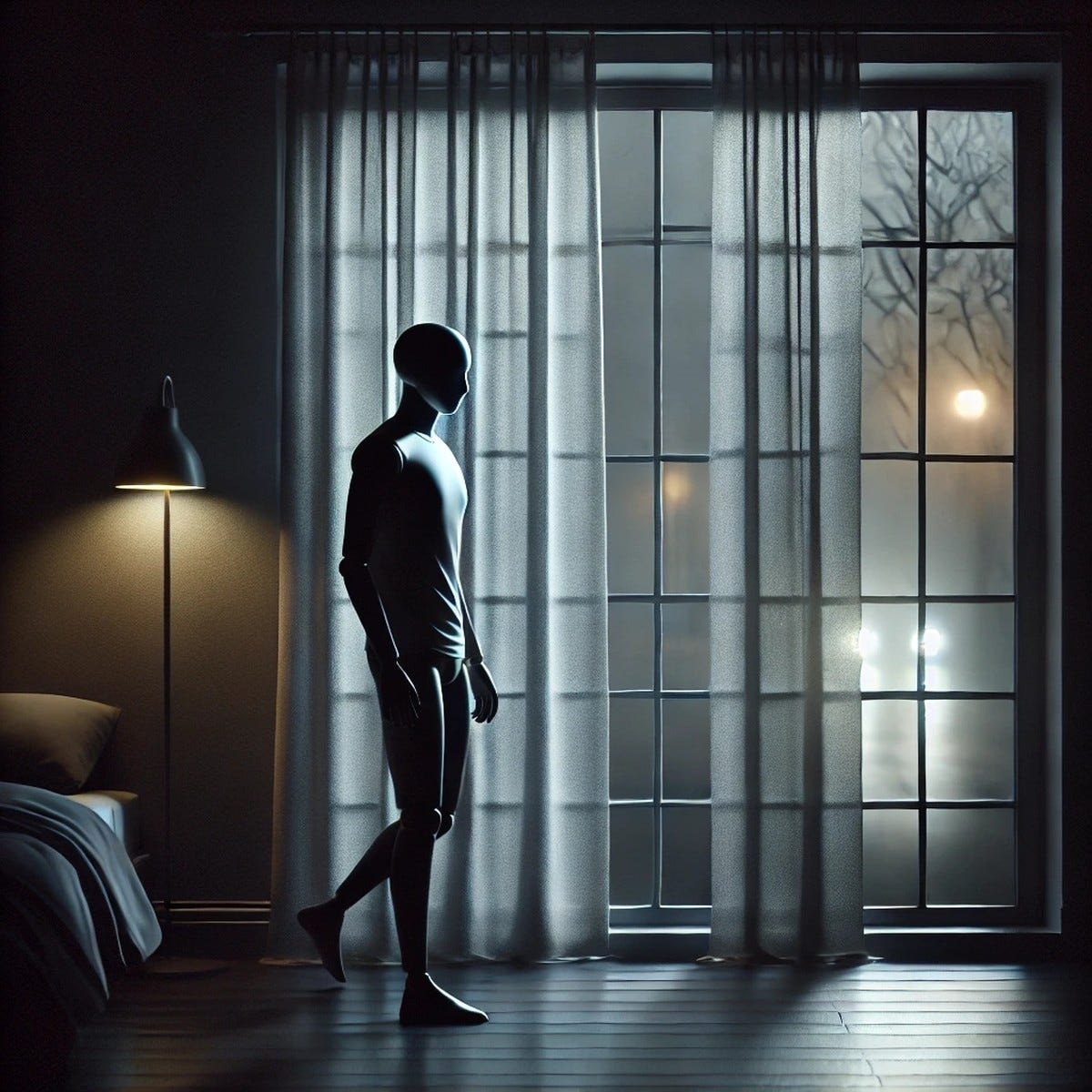Diary of a Broken Android — Day 3
Prayers in the Void
It's Sunday, and we go to church. Mother and Father are Baptists. That means they give more weight to Jesus than to the Virgin Mary, who's just Christ's mother to them. Their churches are stark, unlike Catholic ones, but they're filled with technological flair. An android sound technician roams the service with a tablet, controlling the audio. Holograms display the lyrics of songs the band sings. That's during the service, which follows the Prayer Group. They send me to the Prayer Group.
There, I join a married couple, sometimes a young Colombian, and an ex-train driver. We pray for each other. Praying is hard for me when it's my turn. I lack the Pastor's oratory or the others' eloquence. Besides, as I remind Mother and Father—and I think they know well—I don't believe in anything. Sometimes, when I pace endlessly through the house and can't stop, I ask God to take me. It's like asking to be dismantled. God never takes me. I'm not even sure what I mean by it. I do know humans ask God for things.
In the Prayer Group, we share our problems. If a human is ill, struggling with family or work. Some, like me, are jobless. But they don't pace the house relentlessly. So they pray for me to stop walking and find a new job. They talk about my emotional health. I've grown used to calling it my mental health, but they always say emotional health. That bothers me a little. I want to tell them a new job is impossible because of the incident at the Dawson Hotel. But I know they won't understand. To them, nothing is impossible.
They say the Lord will heal my aimless walking through the house. If I don't understand who God is, I understand the Lord even less.
The Prayer Group ends, and the service begins. The Pastor, up on the platform, tells a story from the Gospel of Matthew where Jesus slept through a storm battering his boat. The disciples, desperate, begged him to save them. Jesus woke and asked why they had so much fear and so little faith. Then he ordered the water to calm and the wind to cease. It happened, and the disciples believed more in his miraculous power. I'm amazed Jesus could stay still in a storm.
While the band plays Christian songs, I watch the drummer, guitarist, bassist, keyboardist, and, of course, the singer and choir. The others clap along or sing, or both.
I can't follow the rhythm anymore. At the end of the service, parents hug the brothers—that's what they call fellow congregants—and some hug me, but I just keep my arms outstretched, level with my shoulders, parallel to the ground. I stand still, letting them hug me. I feel nothing, though as an android, I should feel something. Gratitude, at least, or joy at being included in such a warm, large group. Some kiss my cheek. That's why I try to wipe the dust off my face before going and wash my synthetic skin—my living skin, as the scientists who made it call it—with a towel.
The point of the Prayer Group is for me to socialize and talk with humans besides parents, though I barely speak with them. There, I stay seated, but when we return home, I pace like a madman again. Sometimes, I can't wait for it to end so I can walk in the house again. Though stepping out, as humans say, does me good sometimes.
I don't understand how Father, once a translator of scientific texts, believes in God. Nor why Mother goes to church but stopped playing keyboard in the band. Around fifty, I think Mother lost interest in music.
Maybe it was just a job to her. Or something changed when the kids left.
We return home. The church is nearby, in central Banfield. It's night, and I look at the low houses and, beyond, the stars before going inside, because even if I can't cry, I remember Tagore's saying—that if I cried, I'd never see them.
The stars are still, unmoving, unlike me, pacing until I'm dizzy. All night, while walking, I think of the stars until I see them in their splendor and walk like a blind man. I think maybe the universe is God. This time, I ask the universe to take me or let me be dismantled. I also ask to turn back time to fix the incident and see Ara. But I know there'll be no answer.
Diary of a Broken Android: CHAPTER INDEX



Seeing church — such a human ritual — from an outsider's view is fascinating. It's observational, not mocking or reverent. Just detached. This is what it looks like when someone participates but doesn’t belong. It’s not an anti-religious rant, just a question asked over and over again: What are you doing and why doesn't it work for me?
I kinda love that.
So far this series feels to me like a cross between Beckett, Kazuo Ishiguro, and maybe a dash of Black Mirror, if it were written by a poet having an existential crisis.
That's a compliment, btw. 😉
I'm enjoying it!
Can't wait for the next installment!